|
|
|
Sort Order |
|
|
|
Items / Page
|
|
|
|
|
|
|
| Srl | Item |
| 1 |
ID:
071927
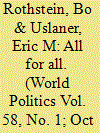

|
|
|
|
|
| Publication |
2005.
|
| Summary/Abstract |
The importance of social trust has become widely accepted in the social sciences. A number of explanations have been put forward for the stark variation in social trust among countries. Among these, participation in voluntary associations received most attention. Yet there is scant evidence that participation can lead to trust. In this article, the authors examine a variable that has not gotten the attention it deserves in the discussion about the sources of generalized trust, namely, equality. They conceptualize equality along two dimensions: economic equality and equality of opportunity. The omission of both these dimensions of equality in the social capital literature is peculiar for several reasons. First, it is obvious that the countries that score highest on social trust also rank highest on economic equality, namely, the Nordic countries, the Netherlands, and Canada. Second, these countries have put a lot of effort in creating equality of opportunity, not least in regard to their policies for public education, health care, labor market opportunities, and (more recently) gender equality. The argument for increasing social trust by reducing inequality has largely been ignored in the policy debates about social trust. Social capital research has to a large extent been used by several governments and policy organizations to send a message to people that the bad things in their society are caused by too little volunteering. The policy implications that follow from the authors' research is that the low levels of trust and social capital that plague many countries are caused by too little government action to reduce inequality. However, many countries with low levels of social trust and social capital may be stuck in what is known as a social trap. The logic of such a situation is the following. Social trust will not increase because massive social inequality prevails, but the public policies that could remedy this situation cannot be established precisely because there is a genuine lack of trust. This lack of trust concerns both "other people" and the government institutions that are needed to implement universal policies.
|
|
|
|
|
|
|
|
|
|
|
|
|
|
|
|
| 2 |
ID:
104552
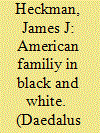

|
|
|
| 3 |
ID:
172479
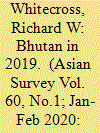

|
|
|
|
|
| Summary/Abstract |
Bhutan in 2019 was dominated by the change of government in late 2018, better diplomatic relations with India, and cultivation of relations with China. The economy was strong, with the country due to graduate from least developed country status in 2023, though unemployment is a concern.
|
|
|
|
|
|
|
|
|
|
|
|
|
|
|
|
| 4 |
ID:
103542
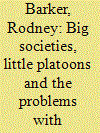

|
|
|
|
|
| Publication |
2011.
|
| Summary/Abstract |
Conservative talk of a 'big society' is one more mutation of the unstable family of pluralism. It is a large family, with both benign and progressive left wing members and rogue right wing black sheep. The progressive contribution has been substantial, but pluralism is not a homogeneous ideology or set of policies, and the single word conceals stresses and irreconcilable oppositions in theory and practice. An examination of this variety gives clues to the latest contributions, and to some of the more regressive uses to which pluralism can be put. The left needs both to insist on its own major contribution to progressive pluralism, and to beware of wolves in pluralist clothing.
|
|
|
|
|
|
|
|
|
|
|
|
|
|
|
|
| 5 |
ID:
171046
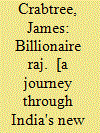

|
|
|
|
|
| Publication |
Noida, HarperCollins Publishers, 2018.
|
| Description |
xxv, 358p.hbk
|
| Standard Number |
9789353020170
|
|
|
|
|
|
|
|
|
|
|
|
Copies: C:1/I:0,R:0,Q:0
Circulation
| Accession# | Call# | Current Location | Status | Policy | Location |
| 059862 | 330.954/CRA 059862 | Main | On Shelf | General | |
|
|
|
|
| 6 |
ID:
178921
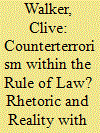

|
|
|
|
|
| Summary/Abstract |
The rule of law remains a hallowed principle even in the unpromising environment of counterterrorism, but failures to live up to rule of law rhetoric must be highlighted. As a result, one might question whether counterterrorism can realistically be conducted wholly in accordance with the rule of law. So, is the rule of law rhetoric or reality? In practice, it remains exceptional for states to resort to express or wide derogations from rule of law standards because of counterterrorism, but notable exceptions in reality undermine the rhetoric of rule of law dominion. By dissecting the rule of law into its constituent components, it is possible to gain a clearer picture of strong and weak points in the rule of law, though no single doctrine, instrument or institution can be found to offer transformational reinforcement. In view of the permanence of counterterrorism, the model required is neither one of accommodation nor an unthinking acceptance of framing ideas such as “the war on terror.” Instead, the rule of law rhetoric demands constant refinement and renewal within the mechanisms of constitutionalism in order to support the reality of rule of law. These precepts will be considered in the context of counterterrorism experiences in the United Kingdom.
|
|
|
|
|
|
|
|
|
|
|
|
|
|
|
|
| 7 |
ID:
092870
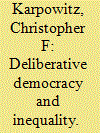

|
|
|
|
|
| Publication |
2009.
|
| Summary/Abstract |
Deliberative democracy grounds its legitimacy largely in the ability of speakers to participate on equal terms. Yet theorists and practitioners have struggled with how to establish deliberative equality in the face of stark differences of power in liberal democracies. Designers of innovative civic forums for deliberation often aim to neutralize inequities among participants through proportional inclusion of disempowered speakers and discourses. In contrast, others argue that democratic equality is best achieved when disempowered groups deliberate in their own enclaves (interest groups, parties, and movements) before entering the broader public sphere. Borrowing from each perspective, the authors argue that there are strong reasons to incorporate enclave deliberation among the disempowered within civic forums. They support this claim by presenting case study evidence showing that participants in such forums can gain some of the same benefits of deliberation found in more heterogeneous groups (e.g., political knowledge, efficacy and trust), can consider a diversity of viewpoints rather than falling into groupthink and polarization, and can persuade external stakeholders of the legitimacy of the group's deliberations.
|
|
|
|
|
|
|
|
|
|
|
|
|
|
|
|
| 8 |
ID:
046035


|
|
|
|
|
| Publication |
London, Lynne Rienner, 2002.
|
| Description |
vii, 203p.
|
| Standard Number |
1588260283
|
|
|
|
|
|
|
|
|
|
|
|
Copies: C:1/I:0,R:0,Q:0
Circulation
| Accession# | Call# | Current Location | Status | Policy | Location |
| 046804 | 321.8/TUL 046804 | Main | On Shelf | General | |
|
|
|
|
| 9 |
ID:
148848
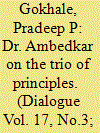

|
|
|
| 10 |
ID:
128529
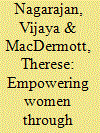

|
|
|
|
|
| Publication |
2013.
|
| Summary/Abstract |
Although the pluralist system of land tenure in Vanuatu does not directly discriminate against women, the operation of the system and contemporary interpretations of custom is increasingly marginalising women from the decision making processes regarding land management and control. Commitment to the principles of gender equality through constitutional guarantees and the ratification of relevant international treaty obligations, while providing a relevant legal framework for equality, have only had limited success in addressing discriminatory practices. This article analyses alternative ways to overcome the barriers faced by women that are currently under consideration in many Pacific island Countries, including recording and registration, as well as legal vehicles such as incorporating customary land groups, trusts and community companies. This article concludes that while both existing and proposed mechanisms have the potential to secure for women a greater role in decision making processes regarding land management and control, that potential will not be realised in the absence of knowledge, empowerment and the acceptance of the legitimacy of such rights
|
|
|
|
|
|
|
|
|
|
|
|
|
|
|
|
| 11 |
ID:
171120


|
|
|
|
|
| Summary/Abstract |
The distinction between formal and substantive equality is theorized then illustrated by sexual harassment law in the United States and in international legal developments. The convergence of sexual harassment concepts with prostitution, hence of sex discrimination law with the Nordic/Equality Model, is explained and explored.
|
|
|
|
|
|
|
|
|
|
|
|
|
|
|
|
| 12 |
ID:
030931
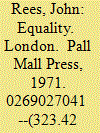

|
|
|
|
|
| Publication |
London, Pall Mall Press, 1971.
|
| Description |
152p.
|
| Series |
Key concepts in political science
|
| Standard Number |
0269027041
|
|
|
|
|
|
|
|
|
|
|
|
Copies: C:1/I:0,R:0,Q:0
Circulation
| Accession# | Call# | Current Location | Status | Policy | Location |
| 008319 | 323.42/REE 008319 | Main | On Shelf | General | |
|
|
|
|
| 13 |
ID:
142692
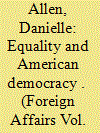

|
|
|
|
|
| Summary/Abstract |
Since the trend toward rising economic inequality [1] in the United States became apparent in the 1990s, scholars and commentators have heatedly debated its causes and consequences. What has been less evident is a vigorous positive discussion about what equality means and how it might be pursued.
|
|
|
|
|
|
|
|
|
|
|
|
|
|
|
|
| 14 |
ID:
118265
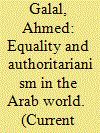

|
|
|
|
|
| Publication |
2012.
|
| Summary/Abstract |
A continuation of past redistributive policies in the post-Arab Spring period is not a viable option.
|
|
|
|
|
|
|
|
|
|
|
|
|
|
|
|
| 15 |
ID:
144743
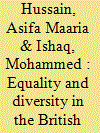

|
|
|
|
|
| Summary/Abstract |
The UK's changing political and legal landscape since 2000 reflecting transformations in wider society have elevated equality and diversity (E&D) issues to prominence in the public sector, including in the British armed forces. This research highlights key developments in the British military in relation to E&D, focusing both on areas of progress, and on the challenges still confronting the Forces. The findings reveal that the Forces have made significant strides in advancing E&D through the implementation of a range of policy initiatives but the persistence of discrimination, developments in the wider environment and the dilemmas raised by the strands of age and disability pose challenges. The value of this research is to increase our understanding of diversity management in a public sector institution that has been under-researched and views itself as “different,” and will be of interest to policymakers, E&D practitioners and academics in the field.
|
|
|
|
|
|
|
|
|
|
|
|
|
|
|
|
| 16 |
ID:
113819
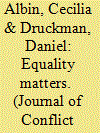

|
|
|
|
|
| Publication |
2012.
|
| Summary/Abstract |
This article explores relationships between procedural justice (PJ) in the negotiation process, distributive justice (DJ) in the terms of negotiated agreements, and their durability in cases of civil war. Adherence to PJ principles was found to correlate strongly with agreements based specifically on the DJ principle of equality. Agreements were also found to be more durable when based on equality, but not when based on other DJ principles. The equality principle accounted for the relationship between PJ and durability irrespective of differences between the parties in power. Further examination suggested that two types of equality in particular-equal treatment and equal shares-were associated with forward-looking agreements and high durability. The findings suggest that durability is served by including equality in the terms of agreements, and that PJ helps (but does not guarantee) achieving such agreements.
|
|
|
|
|
|
|
|
|
|
|
|
|
|
|
|
| 17 |
ID:
000666
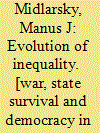

|
|
|
|
|
| Publication |
Stanford, University Press, 1999.
|
| Description |
xx, 349p.
|
| Standard Number |
0804233767
|
|
|
|
|
|
|
|
|
|
|
|
Copies: C:1/I:0,R:0,Q:0
Circulation
| Accession# | Call# | Current Location | Status | Policy | Location |
| 042042 | 323.42/MID 042042 | Main | On Shelf | General | |
|
|
|
|
| 18 |
ID:
179869
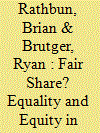

|
|
|
|
|
| Summary/Abstract |
American politicians repeatedly and strenuously invoke concerns about fairness when pitching their trade policies to their constituents, unsurprisingly since fairness is one of the most fundamental and universal moral concepts. Yet studies to date on public opinion about trade have not been designed in such a way that they test whether fairness is important, nor whether the mass public applies fairness standards impartially. Drawing on findings in social psychology and behavioral economics, we develop and find evidence for an “asymmetric fairness” argument. In a national survey of Americans, we find strong evidence that fairness, conceived in terms of equality, is crucial for understanding support for potential trade deals and support for renegotiating existing ones. Americans view as most fair and most preferable outcomes in which concessions and benefits are equal across countries, especially when those equal benefits match productivity. However, we find that Americans have an egoistically biased sense of fairness, responding particularly negatively to any outcome that leaves the United States relatively worse off—a sense of injustice that does not extend to the same degree to relative gains for Americans.
|
|
|
|
|
|
|
|
|
|
|
|
|
|
|
|
| 19 |
ID:
178046
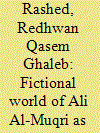

|
|
|
|
|
| Summary/Abstract |
This study aims at highlighting the artistic and intellectual vision of Ali Al-Muqri, a prominent contemporary Yemeni novelist, in The Handsome Jew, a narrative that marks a sharp departure from the works of his contemporaries in terms of its themes, technical devices, and discursive strategies. Much has been written about the relation between Muslims and Jews in the world literature. However, most, if not all, have a masculine stamp. The norm has been reversed here, Fatima, an educated Muslim woman, loves Salem, the Jew, and marries him. In contrast to the derogatory image of the Jew in literature, Salem seems open-minded and very humane. It is hypothesized that all religions are subject to interpretation according to human needs and that all religions are a source of union, not separation. Building on an eclectic theoretical framework with the analytical method, this study analyzes The Handsome Jew that is still incarcerated within the local Yemeni linguistic and cultural barrier and aims to locate the Yemeni narrative in the realm of Arabic and world literature. The conclusions of the study are as follows: despite different religions and cultures, there is a possibility for coexistence and establishing social relationships, as it happened with Fatima and Salem, who introduce a kind of sublime human reconciliation that has not touched the sacred belief of both. Learning the other’s culture and reading freely, away from the preceding and inherited views, is essential for a healthy society. It would make Muslims love the Jews and would make the Jews love the Muslims. Love is a natural humanistic energy that challenges human-made cultural barriers.
|
|
|
|
|
|
|
|
|
|
|
|
|
|
|
|
| 20 |
ID:
085260


|
|
|
|
|
| Publication |
2008.
|
| Summary/Abstract |
The war on terror has triggered intense about the role of security and liberty, the trade - off between security and liberty, the meaning of security and the power of civil liberty.
|
|
|
|
|
|
|
|
|
|
|
|
|
|
|
|
|
|
|
|
|